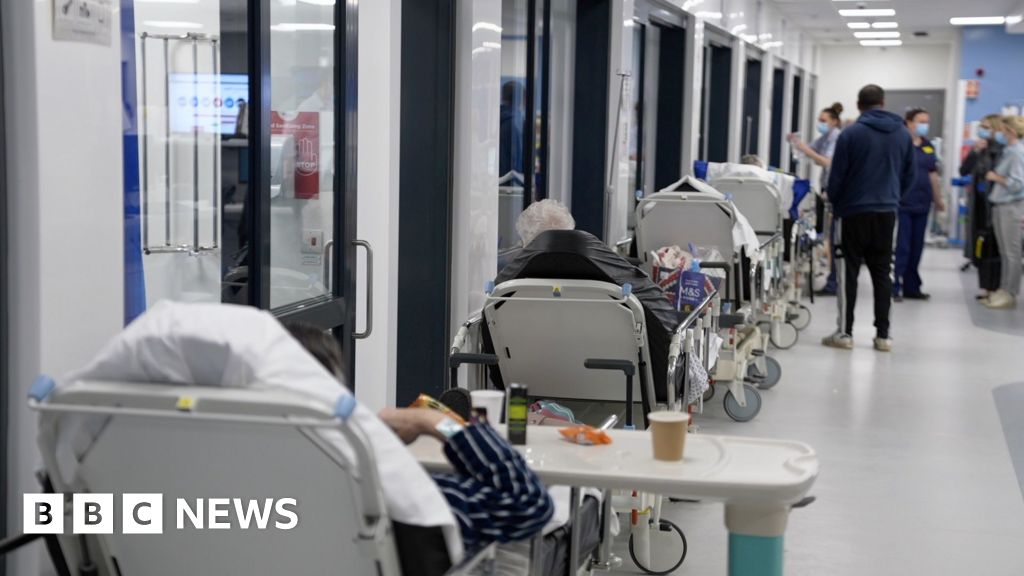“I’ve got no oxygen”, cries emergency department nurse Lisa Blackwell.
She calls for more supplies just as three ambulances are about to arrive at Chesterfield Hospital in Derbyshire.
The new state-of-the-art A&E unit was opened less than two years ago but is already struggling to keep up with demand.
During several days of filming, BBC News saw 22 cubicles in the major bays full, with beds overflowing into the corridors.
“There’s no dignity in this,” says senior matron Stacie Russon.
An elderly lady has fallen on the slippery ice outside and has a large cut to her forehead. The blood is dripping down her cheeks. Her son gently tries to dab it away with a tissue as a nurse comes by with a blood pressure stand.
Her trolley is in a line of five banked up outside cubicles, while the patient on a bed in front vomits into a sick bowl.
Nationally, flu numbers are finally falling. The hope is that patient numbers would fall too – but the cold snap is posing problems.
“The cold and ice isn’t a good combination for elderly people,” says Dr Dan Crook, clinical co-lead in the emergency department.
One lady, Ann, had her leg crushed by her car after it slid on the ice and trapped her against the garage door.
“Some local school children heard me screaming and eventually gathered enough of them to push my car over and rescue me. They were amazing,” says Ann.
Patients are also presenting with hypothermia.
Michael Alton, 83, is in the resuscitation bay. When he arrived his temperature had fallen to 30.6C (87F).
He was found by his neighbour, who decided that waiting for an ambulance would take too long and drove him in.
As bloods are taken, heating blankets work fast to try and bring his temperature back up to the normal range of around 37C (99F). He’s confused and weak.
The beep of Dan Crook’s emergency pager signals another job and he rushes off to the ambulance arrival bay.
James Oakes is elderly, hypothermic and confused. The paramedics fear sepsis.
“He’s a farmer,” says Dan. “He’s soldiered on for a while but now he’s critically ill. We need to get his temperature and oxygen levels up fast.”
A patient like James should be seen in the resuscitation bay as well but it’s full.
Instead he’s assessed and stabilised in the ambulance area. It is only when he is eventually moved into a cubicle that the nurse has time to remove his muddy Wellington boots.
“How long will I be here for?” he asks. His animals need feeding. “I’ve never been to hospital before and I don’t want to stay here long.”
Managing the flow through a hospital – that is, freeing up beds by moving on those who are ready to leave – is a vital and challenging task.
Dr Hal Spencer, a medical consultant and chief executive of Chesterfield Royal, says up to 80 beds out of 540 are occupied by patients who are fit to leave but cannot because of issues at home or with social care.
Some of these patients have been admitted even though there is nothing fundamentally wrong – they just have nowhere else safe to return to.
“It makes it very difficult because it means we don’t have the capacity to look after people who need care most but when it’s 02:00 we end up looking after these people – it’s the right thing to do,” says Dr Spencer.
The message from Chesterfield’s staff is that they are coping, just, and that they are offering safe care.
But they are clear it’s nowhere near where it should be and, through no fault of their own, the standard is falling short of what they were trained to provide.




